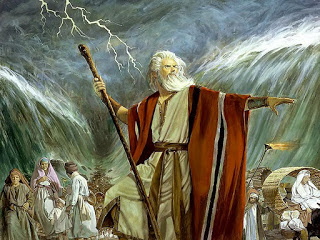Reflecting on the Leadership of Moses and Joshua
If we desire to see improvement as Christian leaders today, we need to return to the Old Testament. Several of its books will challenge us to revisit our notions about leadership. Let’s turn to the book of Exodus, which narrates the Hebrews’ experience of enslavement in Egypt. It was amid this era that Moses was born and that he went into exile for killing an Egyptian. Sometime later, Moses encountered God in a burning bush, discovered God’s plan to save Israel, and learned God’s name. The LORD God elected him to liberate and save Israel.

When we reflect on Moses’ leadership, we naturally think about ancient Israel’s freedom. Truly, there is a deficiency in a kind of leadership today among Christian leaders that the Exodus event suggests with urgency. Today, we need to cultivate among those in the Christian ministry field and within our parishes a Mosaic leadership that is capable of freeing and liberating our brothers and sisters from their sinful circumstances and from the oppressive structures that surround them. Indeed, true leadership frees people, empowers them to grow, and facilitates their social and spiritual advancement.
The stories of Joshua, Gideon, Saul, David, and Solomon also reveal aspects and conditions of leadership that we ought to pay more attention to. Joshua succeeded Moses as the only one who could, given that Moses had laid his hands upon him. Joshua, saturated with the spirit of wisdom (Deut. 34:9), was given the obedience of the Israelites and faithfully carried out the LORD’s command to Moses. The first chapter of Joshua details how God granted protection and authority to Joshua just as Moses had them. With this divine protection and authority, Joshua also possessed essential leadership characteristics that are equally crucial for leaders. He exhibited very powerful leadership skills in decision-making and organization even when he was quite advanced in age. We read about him using these skills, particularly in chapters 13 through 22, when he divided the land among the tribes and resolved the (potential) conflicts related to boundaries and territories.
What is Needed In Christian Leadership
Gideon highlighted the importance of leading through obedience. He prepared for battle by assembling a large army, but the LORD informed Gideon that he had too many soldiers. A modern military leader might respond, “How can one possibly have too many soldiers?!” Nonetheless, Gideon obeyed the LORD, reduced the number of soldiers from 32,000 to 300, and still defeated the 135,000 strong Midian army. An obedient leader is a fruitful and victorious one.
Our thoughts, words, and actions often portray the type of leader we are. As Christian leaders, we can learn something about how we ought to think, speak, and act as leaders by also considering the leadership of Saul, David, and Solomon. These three were not perfect leaders—indeed, who is? However, from King Solomon, we discover the importance of being a wise thinker. David’s leadership advises us that we must learn to speak confidently and persuasively and to pray fervently. Lastly, Saul’s leadership instructs us to act courageously, no matter what the circumstances are. In short, Christian leaders ought to be wise, confident, prayerful, and courageous, particularly during these very troubling and disconcerting times we are living in. All these leaders, in some way, prefigure the great Leader, Jesus Christ, who practiced a servant leadership that converts, heals, recreates, and saves. May Christ bless our Christian leaders with the Spirit of wisdom, faith, and fortitude.
(Note: This post was originally published on February 4, 2019.)
